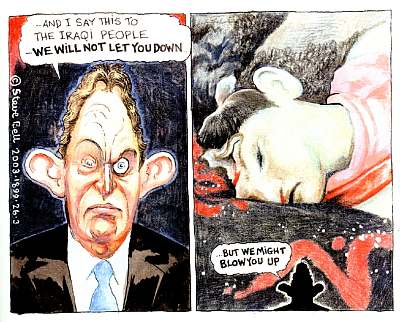Search
Recent comments
- dumb blonde....
1 hour 54 min ago - unhealthy USA....
2 hours 27 min ago - it's time....
2 hours 49 min ago - pissing dick....
3 hours 8 min ago - landings.....
3 hours 20 min ago - sicko....
16 hours 8 min ago - brink...
16 hours 24 min ago - gigafactory.....
18 hours 11 min ago - military heat....
18 hours 54 min ago - arseholic....
23 hours 37 min ago
Democracy Links
Member's Off-site Blogs
the prince of perfidy .....

Ex-Prime Minister and post-Downing Street millionaire Tony Blair, to celebrate the publication of his book A Journey, is holding a 'signing' session at Waterstones, Piccadilly on 8 September. That this man, responsible for taking us into an illegal war, playing his part in the ruination of an ancient country because he 'believed he was right', should advertise himself in this way has caused outrage. Time, I think, to look at where we, and Blair, actually stand in terms of what we can and cannot do to call him to account.
We have spent years constructing that body of treaties, statutes and conventions known as international law only to ignore it when it is most needed. How often has any state or rather, how many powerful Western states have been brought to account for breaching international law? And how many exempt themselves from the laws while insisting others abide by them? The world's record at upholding its own laws is poor. The United Nations passes Resolutions where states have breached international law, demanding compliance. It imposes sanctions, hoping to force compliance. But beyond that what is done, except to threaten belligerence? What other routes are available?
When the UN was set up, the International Court of Justice (ICJ) also came into being. It can settle disputes between states and it can give advisory opinions on legal matters when asked by recognised bodies or coalitions of such. A good example of the latter is the opinion they delivered in 1996 for the World Court Project on the legality of the use of nuclear weapons. In neither case does this really result in accountability.
Of the permanent Security Council members only the United Kingdom has made a declaration accepting the jurisdiction of the Court. Nevertheless, they all have judges sitting on the Court's bench, and one of them, Sir Christopher Greenwood, aided the Attorney General Lord Goldsmith with his legal opinion okaying the Iraq invasion in March 2003.
But - the UN Charter authorises the Security Council to enforce the Court's rulings. Security Council members can thus veto any judgement that interferes with the political agendas of those states or their allies. Political interests always seem to override the rule of law.
- By John Richardson at 24 Aug 2010 - 7:28pm
- John Richardson's blog
- Login or register to post comments
accountability .....
Who should be held accountable for the invasion and occupation that has left hundreds of thousands dead?
Riz Khan Interviews John Pilger
The Last US Combat Forces in Iraq?